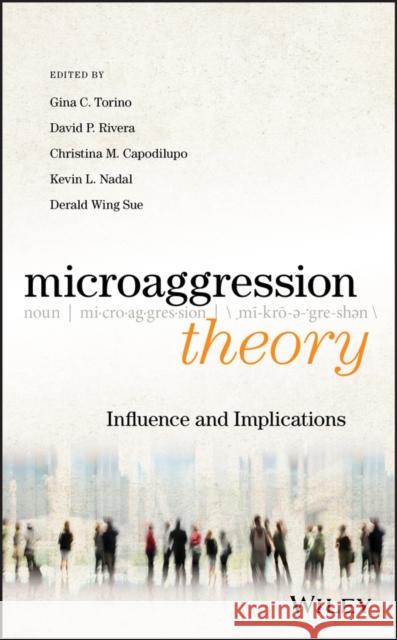Microaggression Theory: Influence and Implications » książka



Microaggression Theory: Influence and Implications
ISBN-13: 9781119420040 / Angielski / Twarda / 2018 / 400 str.
Microaggression Theory: Influence and Implications
ISBN-13: 9781119420040 / Angielski / Twarda / 2018 / 400 str.
(netto: 242,32 VAT: 5%)
Najniższa cena z 30 dni: 251,33
ok. 30 dni roboczych.
Darmowa dostawa!
Get to know the sociopolitical context behind microaggressions
Microaggressions are brief, everyday exchanges that send denigrating messages to certain individuals because of their group membership (e.g. , race, gender, culture, religion, social class, sexual orientation, etc.).
Wydanie ilustrowane
Preface
Acknowledgments
About the Editors
Part I Microaggression Theory
Chapter 1 – Everything You Wanted to Know About Microaggressions but Didn t Get a Chance to Ask
Gina C. Torino, David P. Rivera, Christina M. Capodilupo, Kevin L. Nadal and Derald Wing Sue
Chapter 2 – Aversive Racism, Implicit Bias, and Microaggressions
John F. Dovidio, Adam R. Pearson and Louis A. Penner
Chapter 3 – Multidimensional Models of Microaggressions and Microaffirmations
James M. Jones and Rosalie Rolón–Dow
Chapter 4 Intersectionality Theory and Microaggressions: Implications for Research, Teaching and Practice
Jioni A. Lewis, Marlene G. Williams, Anahvia Taiyib Moody, Erica J. Peppers and Cecile A. Gadson
Part II Detrimental Impact of Microaggressions
Chapter 5 Microaggressions: Clinical Impacts and Psychological Harm
Jesse Owen, Karen W.Tao and Joanna M. Drinane
Chapter 6 Microaggressions: Considering the Framework of Psychological Trauma
Thema Bryant–Davis
Chapter 7 – Factors Contributing to Microaggressions, Racial Battle Fatigue, Stereotype Threat and Imposter Phenomenon for Non–Hegemonic Students: Implications for Urban Education
Jennifer Martin
Chapter 8 – Microaggressions and Internalized Oppression: Intrapersonal, Interpersonal and Institutional Impacts of Internalized Microaggressions
E. J. R. David, Jessica Petalio and Maria Crouch
Chapter 9 I Didn t Know That Was Racist : Costs of Racial Microaggressions to White People
D Anthony Clark and Lisa Spanierman
Part III – Manifestation of Microaggressions
Chapter 10 The 360 Degree Experience of Workplace Microaggressions: Who Commits Them? How Do Individuals Respond? What are the Consequences?
Jennifer Y. Kim, Duoc Nguyen and Caryn Block
Chapter 11 Microaggressions: Toxic Rain in Health Care
Silvia L. Mazzula and Rebecca R.Campón
Chapter 12 From Racial Microaggressions to Hate Crimes: A Model of Online Racism Based on the Lived Experiences of Adolescents of Color
Brandesha M. Tynes, Fantasy T. Lozada, Naila A. Smith and Ashley Stewart
Chapter 13 Environmental Microaggressions: Context, Symbols, and Mascots
Jesse A. Steinfeldt, Jacqueline Hyman and M. Clint Steinfeldt
Part IV Microaggressions and Social Policies and Practices
Chapter 14 Microaggressions & Student Activism: Harmless Impact and Victimhood Controversies
Derald Wing Sue
Chapter 15 Radical by Necessity, Not by Choice : From Microaggressions to Social Activism
Michelle Fine, Maria Torre, David Frost and Allison Cabana
Part V Microaggressions: Interventions & Strategies
Chapter 16 Microaggressions: Workplace Interventions
Aisha M. B. Holder
Chapter 17 – Compliments and Jokes : Unpacking Racial Microaggressions in the K–12 Classroom
Rita Kohli, Nallely Arteaga and Alexia Reyes McGovern
Chapter 18 Microaggressions in Higher Education: Embracing Educative Spaces
Kathryn S. Young and Myron R. Anderson
Part VI The Future of Microaggression Theory
Chapter 19 Microaggression Theory: What the Future Holds
Gina C. Torino, David P. Rivera, Christina M. Capodilupo, Kevin L. Nadal and Derald Wing Sue
Gina C Torino, Ph.D., is an Associate Professor of Psychology at SUNY Empire State College in New York.
David P Rivera, Ph.D., is an Associate Professor of Counselor Education at Queens College CUNY in New York.
Christina M Capodilupo, Ph.D., is an Associate Professor in the Department of Counseling and Clinical Psychology at Teachers College, Columbia University.
Kevin L Nadal, Ph.D., is a Professor of Psychology at John Jay College of Criminal Justice in New York.
Derald Wing Sue, Ph.D., is a Professor of Psychology and Education in the Department of Counseling and Clinical Psychology at Teachers College, Columbia University, where he also holds a joint appointment with the School of Social Work.
Get to know the sociopolitical context behind microaggressions
Microaggressions are brief, everyday exchanges that send denigrating messages to certain individuals because of their group membership (e.g., race, gender, culture, religion, social class, sexual orientation, etc.). These daily, common manifestations of aggression leave many people feeling vulnerable, targeted, angry, and afraid. How has this become such a pervasive part of our social and political rhetoric, and what is the psychology behind it?
In Microaggression Theory, the original research team that created the microaggressions taxonomy, Gina Torino, David Rivera, Christina Capodilupo, Kevin Nadal, and Derald Wing Sue, address these issues head–on in a fascinating work that explores the newest findings of microaggressions in their sociopolitical context. It delves into how the often invisible nature of this phenomenon prevents perpetrators from realizing and confronting their own complicity in creating psychological dilemmas for marginalized groups, and discusses how prejudice, privilege, safe spaces, and cultural appropriation have become themes in our contentious social and political discourse.
- Details the psychological effects of microaggressions in separate chapters covering clinical impact, trauma, related stress syndromes, and the effect on perpetrators
- Examines how microaggressions affect education, employment, health care, and the media
- Explores how social policies and practices can minimize the occurrence and impact of microaggressions in a range of environments
- Investigates how microaggressions relate to larger social movements
If you come across the topic of microaggressions in your day–to–day life, you can keep the conversation going in a productive manner with research to back it up!
1997-2026 DolnySlask.com Agencja Internetowa
KrainaKsiazek.PL - Księgarnia Internetowa









